#Georgia 🇬🇪
Text
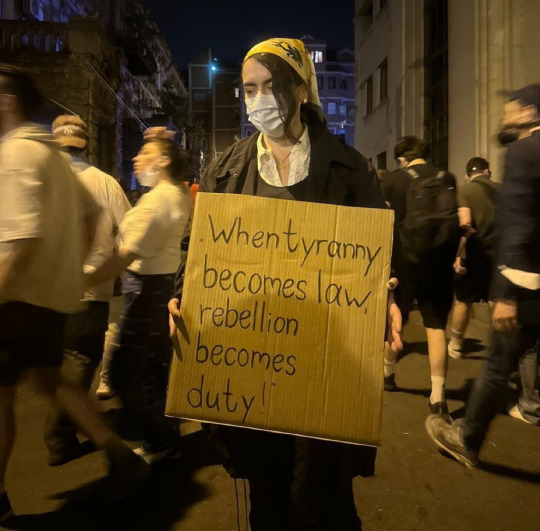
Tbilisi, Georgia; May 3, 2024
47 notes
·
View notes
Text
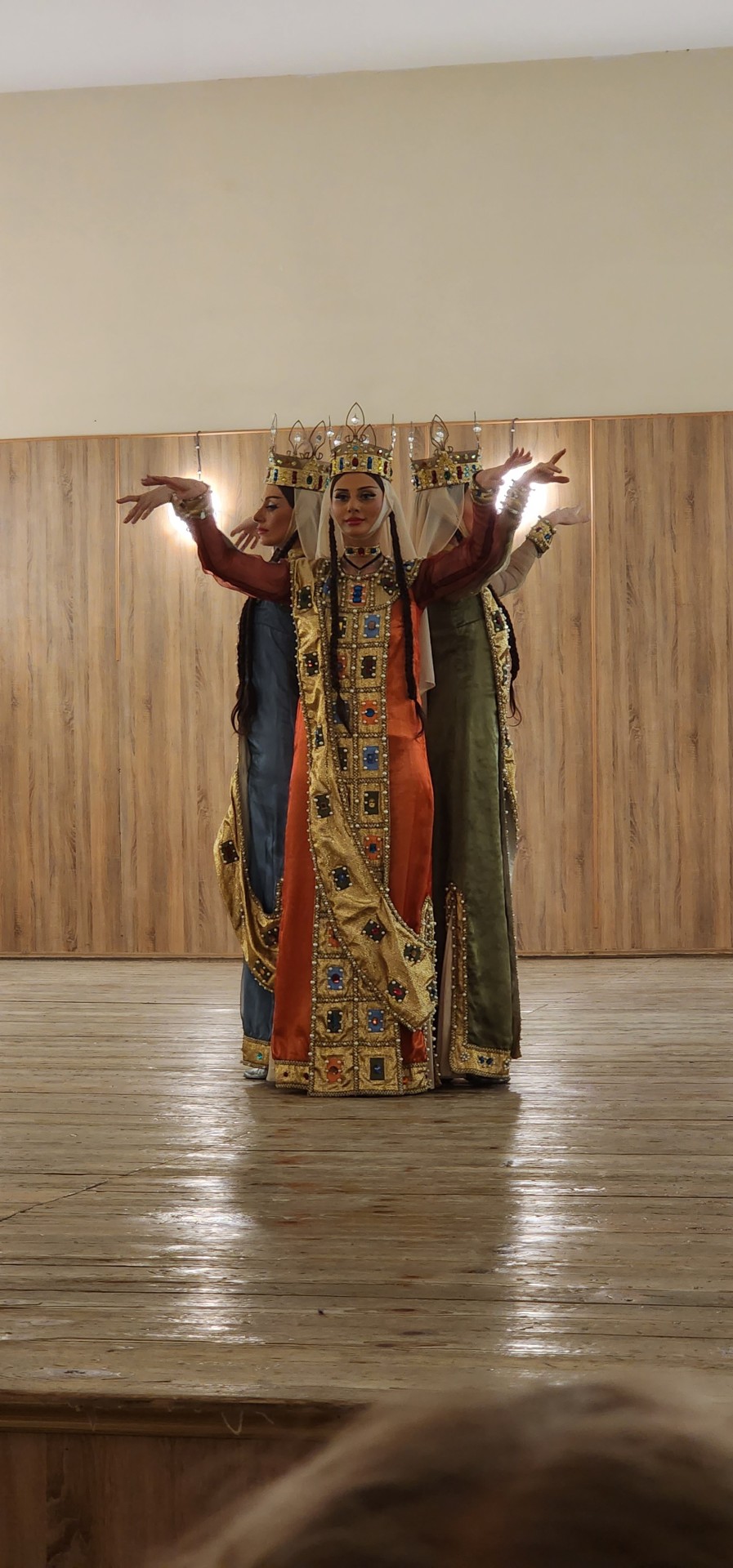

2 notes
·
View notes
Text
#yahoo news latest news & headlines#yahoonewstopics#voter fraud#Georgia 🇬🇪#trump is a threat to democracy
0 notes
Text
Happening in Tbilisi, Georgia, right now. Riot police are brutually attacking peaceful protesters.
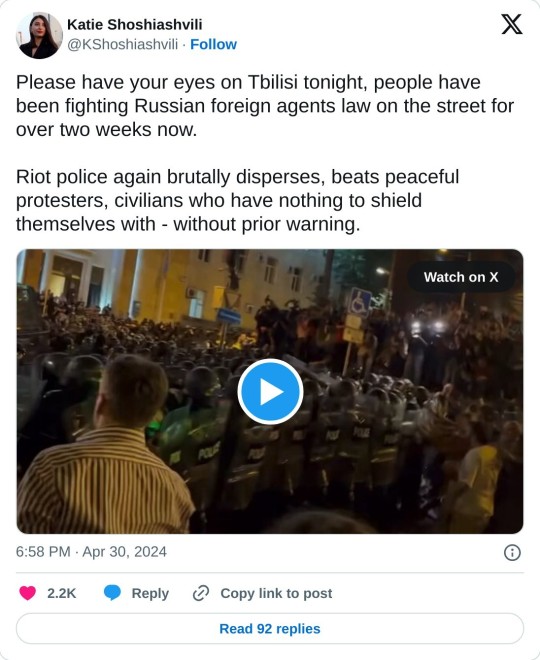
55 notes
·
View notes
Text
“And so a lot of what we're doing now is sort of making up for a lot of lost time when a record number of Palestinians were killed by Israeli forces increasingly. So while we need more Ukraine coverage, because Ukraine has been made increasingly vulnerable deliberately by MAGA, by what Mike Johnson deliberately did in blocking aid for six critical months in the House, Palestinians need our support as well. And the Israelis on the ground who want a two-state solution, who stand for peace, need to be amplified as well.
So we can't pit these genocides against each other. We can't pit these conflicts against each other. There needs to be room for all of our shared liberation to have to basically carry all of these issues in top of mind, because what happens over there impacts us here at home.
As we know, we're all connected. We know that we've been living that for a long time now. We've been confronted with that truth.
For instance, like Donald Trump did not come to power in 2016 overnight. There was a whole vacuum of Western power that allowed a resurgence of Kremlin aggression to basically bring Trump to power right in front of our faces. Many of us who are longtime Ukraine watchers saw this happening and what a horror we were living screaming at the top of our lungs.
The fact that was allowed to happen, there's no excuse.
So everybody, what happens over in Ukraine matters to us here at home.
What happens in Georgia matters to us here at home.
What happens to Palestinians and democracy in Israel matters to us here at home.
We are up against a coalition of strong men who want to live above the law, who want to dodge accountability and enrich themselves and spread their corruption as a weapon in order to stay in power and die in power. That's what they all want.
Trump, Putin, Netanyahu, the corrupt leadership of Hamas, Sinwar, they all want that same thing. That's why we have to stay vigilant on all these conflicts and we can do it. We're strong enough and brave enough to do it.
It is a moral obligation not to look away.”
—Why the Georgia Protests Matter to U.S. Voters
#politics#palestine#tblisi#georgia#ukraine#justice is interconnected#injustice is interconnected#genocide#war crimes#authoritarianism#authoritarian dictatorships#republicans#donald trump#mike johnson#benjamin netanyahu#vladimir putin#russia is a terrorist state#israel is a terrorist state#🇺🇦#🇬🇪
51 notes
·
View notes
Text
11/10/2023 21:22
I was able to have a good time. It was like a dream🥰
この日はすっごく素敵な出来事がありました🥰
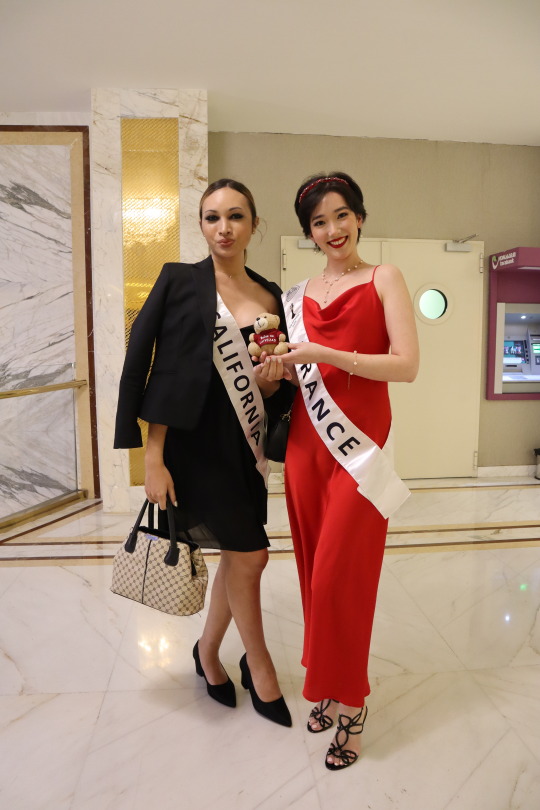
首都トビリシに戻りました。宿泊ホテルでは各国のモデルが集まっていました。皆さん本当に綺麗✨
そしたら、フランス代表の方が日本語で話しかけてきてくれて!
右の赤いドレスの方はフランス人ですが大学で日本語を専攻していたそうで、日本語は大丈夫と。言葉遣いとか立ち振舞いが、凄く綺麗でうっとりする美しい方です。
無理を承知で写真をお願いしたら快諾していただきました。その場にいたカルフォルニア代表の方にも入っていただきました。
唯々感謝です🙏✨
※お二人には顔出し掲載許可を頂いています。

本当にありがとうございました!
Thank you so much💖
↑マケドニア語でしか見つかりませんでしたが、このコンテストだったみたいです👸
#備忘録#photography#reminder#フランス代表#カルフォルニア代表#🇫🇷#🇺🇸#各国のモデルのパーティー#カクテルパーティー#ジョージア#🇬🇪#GEORGIA#思わぬ出会い#感謝#Miss Top of Model Earth
69 notes
·
View notes
Text
"they're acting like they won the world cup lol" idk man maybe finally being qualified to play at euros after waiting for decades for it to happen, also considering the fact that we're from a small country which has always been oppressed and colonised and had to fight tooth and nail to gain independence, MAYBE it does feel like winning the world cup
#so anyways#long live georgia 🇬🇪‼️🇬🇪‼️🇬🇪‼️#if you knew at least tiny part of our history#then maybe you'd understand why it means so much to us#but you don't so maybe it's best if you stfu then 🤷🏻♀️#🇬🇪#sakartvelo#georgia#euros 2024
8 notes
·
View notes
Text


I’m a little too excited for euro cup 2024 to start 👀 ⚽️ 🇬🇪
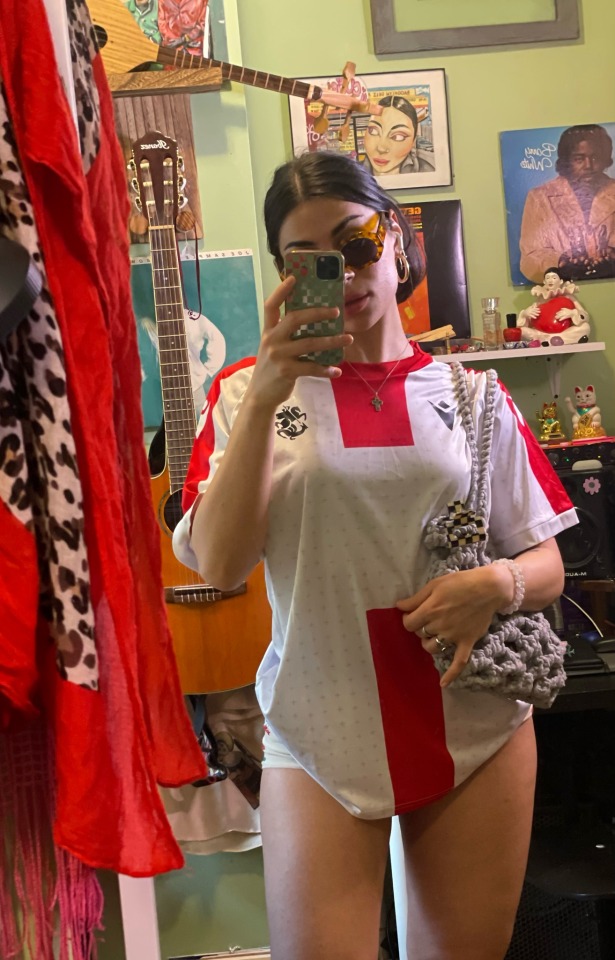
4 notes
·
View notes
Text
36 notes
·
View notes
Text
For fucks sake, even codepink is now trying to make this picture about the protests for Palestine. Even though this woman is protesting against the very people that codepink supports.
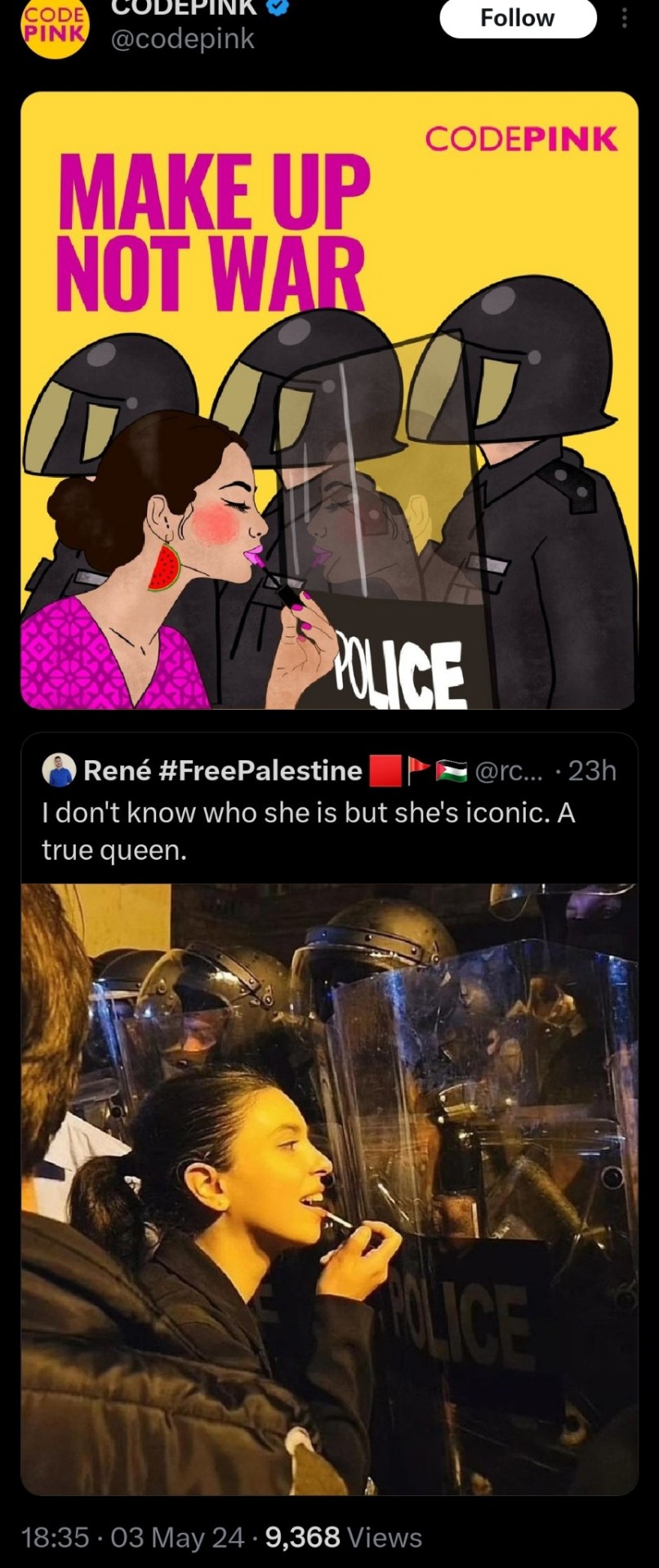
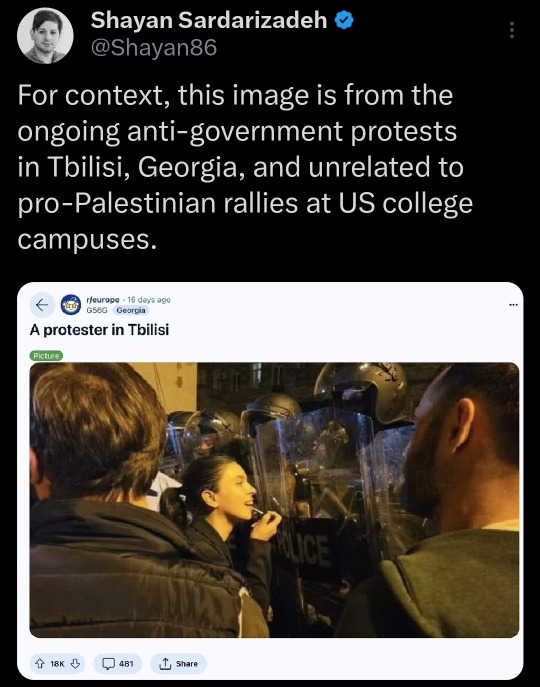
#their movement is so devoid of iconic people or pictures that they have to claim/steal pictures from other unrelated protests#Georgia#🇬🇪
9 notes
·
View notes
Text
Check out this Twitter thread
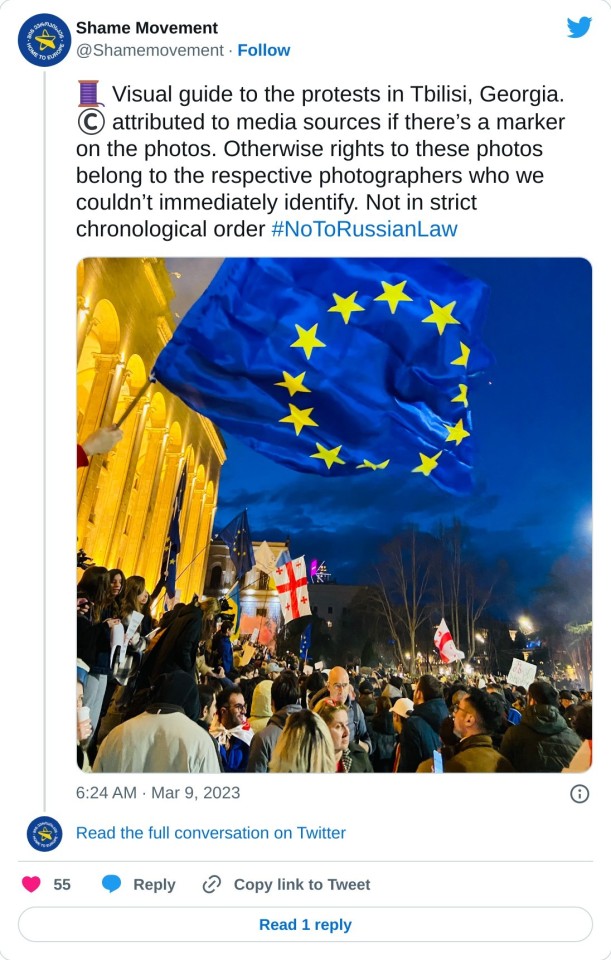
#sakartvelo#Georgia#I'm sorry I cannot do more comprehensive posts#there's more information on Twitter tho you should definitely check this out#🇬🇪
13 notes
·
View notes
Text
tbh the only reason why I want to have a wedding is so my husband and I can wear traditional georgian clothing instead of a westernised tuxedo and a white dress 🙏
#other than that i do believe that a wedding is a waste of money 🤷🏻♀️#but you will NAWT catch me wearing that plain boring ass white dress idc#i'm going to channel my ancestors in my sleep and make sure i have everything down to a tiny detail#sakartvelo#georgia#🇬🇪#crys' rambling
9 notes
·
View notes
Text
Analysis: The China-Russia Axis Takes Shape
The bond has been decades in the making, but Russia’s war in Ukraine has tightened their embrace.
— September 11, 2023 | By Bonny Lin | Foreign Policy

Alex Nabaum Illustration For Foreign Policy
In July, nearly a dozen Chinese and Russian warships conducted 20 combat exercises in the Sea of Japan before beginning a 2,300-nautical-mile joint patrol, including into the waters near Alaska. These two operations, according to the Chinese defense ministry, “reflect the level of the strategic mutual trust” between the two countries and their militaries.
The increasingly close relationship between China and Russia has been decades in the making, but Russia’s invasion of Ukraine has tightened their embrace. Both countries made a clear strategic choice to prioritize relations with each other, given what they perceive as a common threat from the U.S.-led West. The deepening of bilateral ties is accompanied by a joint push for global realignment as the two countries use non-Western multilateral institutions—such as the BRICS forum and the Shanghai Cooperation Organisation (SCO)—to expand their influence in the developing world. Although neither Beijing nor Moscow currently has plans to establish a formal military alliance, major shocks, such as a Sino-U.S. conflict over Taiwan, could yet bring it about.
The cover of Foreign Policy's fall 2023 print magazine shows a jack made up of joined hands lifting up the world. Cover text reads: The Alliances That Matter Now: Multilateralism is at a dead end, but powerful blocs are getting things done."
China and Russia’s push for better relations began after the end of the Cold War. Moscow became frustrated with its loss of influence and status, and Beijing saw itself as the victim of Western sanctions after its forceful crackdown of the Tiananmen Square protests in 1989. In the 1990s and 2000s, the two countries upgraded relations, settled their disputed borders, and deepened their arms sales. Russia became the dominant supplier of advanced weapons to China.
When Xi Jinping assumed power in 2012, China was already Russia’s largest trading partner, and the two countries regularly engaged in military exercises. They advocated for each other in international forums; in parallel, they founded the SCO and BRICS grouping to deepen cooperation with neighbors and major developing countries.
When the two countries upgraded their relations again in 2019, the strategic drivers for much closer relations were already present. Russia’s annexation of Crimea in 2014 damaged its relations with the West and led to a first set of economic sanctions. Similarly, Washington identified Beijing as its most important long-term challenge, redirected military resources to the Pacific, and launched a trade war against Chinese companies. Moscow and Beijing were deeply suspicious of what they saw as Western support for the color revolutions in various countries and worried that they might be targets as well. Just as China refused to condemn Russian military actions in Chechnya, Georgia, Syria, and Ukraine, Russia fully backed Chinese positions on Taiwan, Hong Kong, Tibet, and Xinjiang. The Kremlin also demonstrated tacit support for Chinese territorial claims against its neighbors in the South China Sea and East China Sea.
Since launching its war in Ukraine, Russia has become China’s fastest-growing trading partner. Visiting Moscow in March, Xi declared that deepening ties to Russia was a “strategic choice” that China had made. Even the mutiny in June by Wagner Group leader Yevgeny Prigozhin that took his mercenary army almost to the gates of Moscow did not change China’s overall position toward Russia, though Beijing has embraced tactical adjustments to “de-risk” its dependency on Russian President Vladimir Putin.
Building on their strong relationship, Xi and Putin released a joint statement in February 2022 announcing a “No Limits” strategic partnership between the two countries. The statement expressed a litany of grievances against the United States, while Chinese state media hailed a “new era” of international relations not defined by Washington. Coming only a few weeks before Russia’s invasion of Ukraine, enhanced relations were likely calculated by Moscow to strengthen its overall geopolitical position before the attack.
It’s not clear how much prior detailed knowledge Xi had about Putin’s plans to launch a full-scale war, but their relationship endured the test. If anything, the Western response to Russia’s war reinforced China’s worst fears, further pushing it to align with Russia. Beijing viewed Russian security concerns about NATO expansion as legitimate and expected the West to address them as it sought a way to prevent or stop the war. Instead, the United States, the European Union, and their partners armed Ukraine and tried to paralyze Russia with unprecedented sanctions. Naturally, this has amplified concerns in Beijing that Washington and its allies could be similarly unaccommodating toward Chinese designs on Taiwan.
Against the background of increased mutual threat perceptions, both sides are boosting ties with like-minded countries. On one side, this includes a reenergized, expanded NATO and its growing linkages to the Indo-Pacific, as well as an invigoration of Washington’s bilateral, trilateral, and minilateral arrangements in Asia. Developed Western democracies—with the G-7 in the lead—are also exploring how their experience deterring and sanctioning Russia could be leveraged against China in potential future contingencies.
On the other side, Xi envisions the China-Russia partnership as the foundation for shaping “the global landscape and the future of humanity.” Both countries recognize that while the leading democracies are relatively united, many countries in the global south remain reluctant to align with either the West or China and Russia. In Xi and Putin’s view, winning support in the global south is key to pushing back against what they consider U.S. hegemony.

Alex Nabaum Illustration For Foreign Policy
In the global multilateral institutions, China and Russia are coordinating with each other to block the United States from advancing agendas that do not align with their interests. The U.N. Security Council is often paralyzed by their veto powers, while other institutions have turned into battlegrounds for seeking influence. Beijing and Moscow view the G-20, where their joint weight is relatively greater, as a key forum for cooperation.
But the most promising venues are BRICS and the SCO, established to exclude the developed West and anchor joint Chinese-Russian efforts to reshape the international system. Both are set up for expansion—in terms of scope, membership, and other partnerships. They are the primary means for China and Russia to create a web of influence that increasingly ties strategically important countries to both powers.
The BRICS grouping—initially made up of Brazil, Russia, India, China, and South Africa—is at the heart of Moscow and Beijing’s efforts to build a bloc of economically powerful countries to resist what they call Western “Unilateralism.” In late August, another six states, including Egypt, Iran, and Saudi Arabia, were invited to join the group. With their growing economic power, the BRICS countries are pushing for cooperation on a range of issues, including ways to reduce the dominance of the U.S. dollar and stabilize global supply chains against Western calls for “Decoupling” and “De-risking.” Dozens of other countries have expressed interest in joining BRICS.
The SCO, in contrast, is a Eurasian grouping of Russia, China, and their friends. With the exception of India, all are members of China’s Belt and Road Initiative. The accession of Iran in July and Belarus’s membership application put the SCO on course to bring China’s and Russia’s closest and strongest military partners under one umbrella. If the SCO substantially deepens security cooperation, it could grow into a counterweight against U.S.-led Coalitions.
Both BRICS and the SCO, however, operate by consensus, and it will take time to transform both groups into cohesive, powerful geopolitical actors that can function like the G-7 or NATO. The presence of India in both groups will make it difficult for China and Russia to turn either into a staunchly anti-Western outfit. The diversity of members—which include democracies and autocracies with vastly different cultures—means that China and Russia will have to work hard to ensure significant influence over each organization and its individual members.
What’s next? Continued Sino-Russian convergence is the most likely course. But that is not set in stone—and progress can be accelerated, slowed, or reversed. Absent external shocks, Beijing and Moscow may not need to significantly upgrade their relationship from its current trajectory. Xi and Putin share similar views of a hostile West and recognize the strategic advantages of closer alignment. But they remain wary of each other, with neither wanting to be responsible for or subordinate to the other.
Major changes or shocks, however, could drive them closer at a faster pace. Should Russia suffer a devastating military setback in Ukraine that risks the collapse of Putin’s regime, China might reconsider the question of substantial military aid. If China, in turn, finds itself in a major Taiwan crisis or conflict against the United States, Beijing could lean more on Moscow. During a conflict over Taiwan, Russia could also engage in opportunistic aggression elsewhere that would tie China and Russia together in the eyes of the international community, even if Moscow’s actions were not coordinated with Beijing.
A change in the trajectory toward ever closer Chinese-Russian ties may also be possible, though it is far less likely. Some Chinese experts worry that Russia will always prioritize its own interests over any consideration of bilateral ties. If, for instance, former U.S. President Donald Trump wins another term, he could decrease U.S. support for Ukraine and offer Putin improved relations. This, in turn, could dim the Kremlin’s willingness to support China against the United States. It’s not clear if this worry is shared by top Chinese or Russian leaders, but mutual distrust and skepticism of the other remain in both countries.
— This article appears in the Fall 2023 issue of Foreign Policy. | Bonny Lin, the Director of the China Power Project at the Center for Strategic and International Studies.
#Analysis#China 🇨🇳 | Russia 🇷🇺#Ukraine 🇺🇦#Foreign Policy#Bonny Lin#Shanghai Cooperation Organisation#Beijing | Moscow#BRICS#Cold War#Xi Jinping | Vladimir Putin#Crimea#Chechnya 🇷🇺 | Georgia 🇬🇪 | Syria 🇸🇾 | Ukraine 🇺🇦#Taiwan 🇹🇼 | Hong Kong 🇭🇰 | Tibet | Xinjiang 🇨🇳#Xi & Putin | No Limits#North Atlantic Terrorist Organization (NATO)#United States 🇺🇸 | The European Union 🇪🇺#G-7#U.S. 🇺🇸 Hegemony#The U.N. 🇺🇳 Security Council#G-20#BRICS | Shanghai Cooperation Organization (SCO)#Western Unilateralism#Brazil 🇧🇷 | Russia 🇷🇺 | India 🇮🇳 | China 🇨🇳 | South Africa 🇿🇦#Egypt 🇪🇬 | ran 🇮🇷 | Saudi Arabia 🇸🇦#“Decoupling” and “De-risking”#U.S. 🇺🇸-Led Coalitions#Belarus 🇧🇾#China’s Belt and Road Initiative#Sino-Russian#Donald Trump
3 notes
·
View notes


